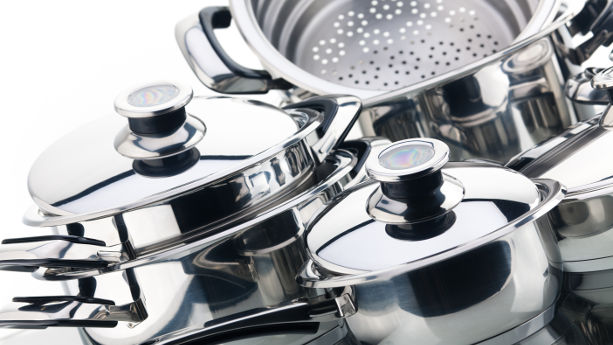
Cookware such as frying pans and woks are covered by food contact material regulations such as 21 CFR or even guidance documents, which for example might regulate lead or cadmium contamination in ceramic products.
Different requirements apply depending on the material, some of which are not even related to food contact materials. For example, specific requirements apply to wooden products and by extension wooden cookware.
In this guide, we cover relevant requirements for cookware such as substance restrictions, labeling, and testing.
Note that the products listed as examples in this guide might not always be specifically mentioned by the regulations. This is because the scope of most relevant regulations is based on specific substances or materials, not products.
Content Overview

FREE CONSULTATION CALL (US, EU & UK)
- Request a free 30-minute call with Ivan Malloci to learn how we can help you with:
- Find product requirements
- Certification and labeling
- Lab testing
General cookware requirements
In this section, we cover various requirements from the Food and Drug Administration (FDA) that apply to food contact materials in general, including cookware.
21 CFR Part 1 – General Enforcement Regulations
21 CFR Part 1 covers general provisions established under the Federal Food, Drug, and Cosmetic Act, for different categories of products such as food, food contact materials, drugs, and cosmetics. However, in this article, we only focus on requirements that are relevant to cookware.
Product examples
Subpart D defines “food contact substance” as a substance meant for use as a part of materials used to hold, manufacture, pack, package, or transport food.
This also includes cookware products that are designed to hold food products, such as for example:
- Saucepans
- Skillets
- Dutch ovens
ACE submission
ACE filers are authorized persons who must submit an electronic import entry for products that are FDA-regulated in the Automated Commercial Environment (ACE) or other EDI systems that are authorized by the CBP.
Per 21 CFR Part 1.72, ACE filers should submit information that includes:
a. Product information:
- FDA Country of Production
- The Complete FDA Product Code
- The Full Intended Use Code
b. Importer’s contact information (e.g., telephone and email address).
21 CFR Part 174 – Indirect Food Additives: General
21 CFR Part 174 covers general provisions for indirect food additives. It also specifies the threshold for restricted substances that might be used in food contact products, such as cookware.
Product examples
This part covers food contact products, which might include cookware such as:
- Woks
- Cooking pans
- Soup pots
Good Manufacturing Practice
Per good manufacturing practices, food additive substances that might migrate to food from cookware should not:
a. In the absence of specified limits, exceed reasonably required amounts to attain the desired effect on the food-contact product.
b. Exceed FDA-prescribed limits.
c. Be meant to physically or technically affect the food, except where permitted by regulations in 21 CFR Parts 170 through 189.
Additionally, food additive substances used in products that are meant to be in contact with food should have a purity that is suitable for their intended use.
21 CFR Part 189 – Substances Prohibited From Use In Human Food
21 CFR Part 189 lists substances that are prohibited from use in human food. Specifically, Subpart D covers substances that are banned from indirect addition from surfaces that are meant to come into contact with food to food. Some of those substances might be relevant for cookware.
Product examples
As mentioned above, Subpart D covers provisions for substances that are banned from usage in food-contact surfaces, which might include cookware. Here we list some examples:
- Frying pans
- Anti-scald pans
- Rubber spatulas
Requirements
Cookware manufacturers should adhere to the relevant substance prohibitions and ensure that their products don’t contain substances such as those prohibited by CFR Part 189.
This includes the following substances:
- Flectol H
- Lead solders
- 4,4′-Methylenebis (2-chloroanaline)
California Proposition 65
California Proposition 65 sets substance restrictions for consumer products sold in California. Restricted substances include lead, cadmium, mercury, and various phthalates. Lab testing is in practice required to verify compliance. Products that contain substances above the set limits may require warning labels.
Note that California Proposition 65 is not specific to cookware, but to consumer products in general.
Country of origin
Country of origin labeling is mandatory for essentially all consumer products sold in the United States. The country of origin mark must accurately describe the country in which the product has been manufactured.
Ceramic cookware
The FDA has specific provisions regarding ceramic cookware, which might contain heavy metals such as cadmium and lead, both of which might contaminate food.
21 CFR Part 109 – Unavoidable Contaminants In Food For Human Consumption And Food-Packaging Material
21 CFR Part 109 contains general requirements regarding unavoidable contaminants in food for human consumption and food packaging material. It also specifies tolerances for substances that are either poisonous or deleterious.
Product examples
This part covers food, including substances (e.g., lead) that migrate to food from ornamental and decorative food-contact products such as:
- Ceramic pans
- Ceramic pots
- Ceramic tea pots
Requirements
Lead may leach into food from ornamental or decorative ceramicware if said products are used to hold, prepare, or serve the food. To prevent such an issue, ornamental or decorative ceramicware is considered to be, and should be regulated as, food contact products unless they are properly labeled to caution against food use.
As such, ornamental or decorative ceramic cookware:
- Should be labeled with: “Not for Food Use. Glaze contains lead. Food Use May Result in Lead Poisoning”
- May contain an additional explanatory statement: “Decorative”
- May contain an advisory non-food symbol
Guidance document – Cadmium contamination
The FDA’s CPG Sec. 545.400 concerns cadmium contamination in imported and domestic ceramic products. This contamination may cause chronic cadmium poisoning.
Product examples
Sec 545.400 covers ceramic products used in preparing, serving, or storing food. This might include cookware items that have the following characteristics:
a. Flatware – ceramic products with an internal depth not exceeding 25 mm.
b. Small hollowware – ceramic products with an internal depth of more than 25 mm and a capacity of less than 1.1 liters.
c. Large hollowware – ceramic products with an internal depth of more than 25 mm and a capacity of 1.1 liters or more.
Requirements
Covered ceramic products should not contain levels of cadmium leaching solution that exceed the restrictions below:
- Flatware – 0.5 micrograms / mL
- Small hollowware – 0.5 micrograms / mL
- Large hollowware – 0.25 micrograms / mL
The product may be considered not for food use if:
a. Its unsuitability for food use is due to a hole bored through the potential food contact surface, or
b. It bears a permanent, damage-proof label on its back that states, “Not for Food Use – Article May Poison Food”.
Guidance document – Lead contamination
CGP Sec. 545.450 concerns lead contamination in imported and domestic ceramic pottery. This contamination could cause chronic lead poisoning.
Product examples
Sec. 545.450 also covers ceramic products used for preparing, serving, or storing food. This might include cookware products that have the following specifications:
a. Ceramic flatware – internal depth less than 25 mm.
b. Small ceramic hollowware – internal depth over 25 mm, capacity less than 1.1 liters.
c. Large ceramic hollowware – internal depth over 25 mm, capacity 1.1 liters or more.
Requirements
Covered ceramic products should not contain levels of lead that could leach in unacceptable amounts. Those amounts are as follows:
- Flatware – 3.0 micrograms / mL
- Small hollowware – 2 micrograms / mL
- Large hollowware – 1.0 micrograms / mL
The ceramic product would be considered unsuitable for food use if it either has a hole through the potential food contact surface or bears one of the following statements:
- “Not for Food Use. May Poison Food”
- “Not for Food-Use. Glaze contains lead. Food Use May Result in Lead Poisoning.”
- “Not for Food Use – Food Consumed from this Vessel [Plate] May be Harmful”
Wooden cookware
The Lacey Act and 7 CFR Part 319.40 apply to products made of wood, including wooden cookware.
Lacey Act
The Lacey Act, which is enforced by the US Department of Agriculture’s (USDA) Animal and Plant Health Inspection Service (APHIS), covers a wide variety of products of plant origin, which include those made from wood. This also includes food contact materials.
Product examples
The Lacey Act covers wooden products, which might include wooden cookware, such as:
- Chopping boards
- Spatulas
- Soup ladles
Requirements
Per APHIS’ requirements, you should submit a Lacey Act declaration for wooden cookware items, if:
a. Your product contains wood or other plant materials.
b. Your product category is listed in the HTS implementation schedule (e.g., Heading 4419 – Tableware & kitchenware of wood).
c. You are importing your products as a “formal entry”.
Importers are also required to exercise “due care” by taking precautions against the importation of illegally harvested plant materials.
Wooden Handicrafts
7 CFR Part 319.40 specifies requirements regarding the importation of wooden handicrafts. We provide some product examples and the requirements below.
Product examples
The USDA APHIS notes that wooden kitchenware is considered handicrafts under 7 CFR Part 319.40. These might includes products such as:
- Serving spoons
- Frying spatulas
- Chopping boards
Requirements
If you import wooden handicrafts (e.g., wooden kitchenware) from China, you should:
a. Check the list of Approved Wooden Handicraft Manufacturers to find out if an approved manufacturer has produced the handicraft product you wish to import.
b. Apply for an import permit.
Stainless steel cookware
Stainless steel cookware importers and manufacturers should ensure that their products comply with relevant regulations and are safe for use before placing them on the market.
Product examples
We list below a few examples of stainless steel cookware:
- Stock pots
- Dutch ovens
- Wok
Requirements
To the best of our knowledge, there aren’t any specific requirements for stainless steel cookware. However, the general requirements listed above still apply.
Additionally, such products might have coatings and paints. As such, you should refer to regulations such as 21 CFR Part 175.
Plastic cookware
Plastic cookware might contain substances regulated by polymers. As such, you need to 21 CFR Part 177 for requirements regarding indirect food additives in polymeric food-contact products.
21 CFR Part 177 – Indirect Food Additives: Polymers
21 CFR Part 177 concerns polymers as indirect food additives for use as components of food contact surfaces.
Product examples
This part lists substances for use as components of single and repeated-use food contact surfaces, including cookware. Here are some product examples:
- Teflon pans
- Non-stick pans
- Non-stick cooking pots
Requirements
Manufacturers should generally adhere to:
a. Substance restrictions – e.g., Acrylonitrile/styrene copolymer is limited to 0.1 parts per million (ppm).
b. Specific lab testing requirements – e.g., semirigid and rigid acrylic and modified acrylic plastics should be tested using the methods specified in 21 CFR 177.1010(c).
c. Good manufacturing practices.
Plated cookware
Plated cookware might contain heavy metals (e.g., lead), which are extractable by acid foods and may cause chronic heavy metal poisoning.
Guidance document – Lead contamination
CGP Sec. 545.500 covers silver-plated hollowware and concerns over its lead contamination caused by interactions with acid foods. The lead contamination could result in long-term lead poisoning if used continuously with food.
Product examples
This guidance document covers silver-plated hollowware. Here are some product examples:
- Silver plated pots
- Silver plated gravy boats
- Silver plated cups
Requirements
Silver-plated cookware should not release:
a. 7 or more micrograms lead/ml of leaching solution (for products intended for adults), or
b. 0.5 or more micrograms lead/ml of leaching solution (for products intended for infants and children)
Sliver-plated products are exempted from the above requirements of they:
a. Carry on the potential food-contact surface a permanent and damage-proof label that states, “Not for Food Use” and “Article May Poison Food”.
b. Can’t hold liquids because have holes.
c. Are considered as souvenir or commemorative products.
Coatings and paints
Cookware may contain substances used as coatings that might be indirectly added to food.
21 CFR Part 175 – Indirect Food Additives: Adhesives And Components Of Coatings
21 CFR Part 175 Subpart B applies to substances for use only as components of adhesives, and Subpart C applies to substances for use as components of coatings.
Product examples
This regulation covers coated cookware, such as:
- Frying pans
- Non stick pans
- Woks
Requirements
21 CFR Part 175 requires manufacturers to adhere to:
a. Substance restrictions (e.g., platinum content of the siloxane and silicone components of coatings should not exceed 150 ppm).
b. Good manufacturing practices.
State regulations
Several states enacted regulations that limit or prohibit the use of BPA, PFAS, and other chemicals on food contact products.
While most of these regulations focus on food packaging, some cover product categories that might include cookware items. Here are a few examples:
a. Vermont – Bill H.152 bans the manufacture, sale, and distribution of PFAS-containing cookware by 2024.
b. New York – Bill A.6932 requires all containers that contain BPA in carry warning labels stating that heating or microwaving said container could harm one’s health.
c. Pennsylvania – Bill H.B.721 bans the manufacture, sale, or distribution of containers used to store, heat, or serve liquids or solids for consumption that have BPA in levels exceeding 0.1 ppb in them.
ASTM standards
The American Society for Testing and Materials (ASTM) develops standards for a broad range of products, which might include cookware.
While these standards are generally voluntary – unless they are incorporated by reference in relevant legislation – importers and manufacturers of cookware can still use them to ensure their products’ safety.
Here are two examples of standards relevant to cookware:
a. ASTM F2643 – Standard Specification for Powered Pot, Pan and Utensil Washing Sinks
b. ASTM F1047 – Standard Specification for Frying and Braising Pans, Tilting Type
Lab testing
You should have your cookware lab tested to ensure that it does not contain restricted substances above the prescribed limitations. You might also need to subject your cookware to mechanical safety, or other types of tests.
When your cookware passes testing, you receive a test report proving your product’s compliance with specific regulations (e.g., 21 CFR Part 177) or standards (e.g., ASTM F2643).
Test methods
Here are three examples of test methods:
a. ASTM C895-87 – Standard Test Method for Lead and Cadmium Extracted from Glazed Ceramic Tile
b. ASTM C1607-12 – Standard Test Method for Determination of “Microwave Safe for Reheating” for Ceramicware
c. ASTM C872-10 – Standard Test Method for Lead and Cadmium Release from Porcelain Enamel Surfaces
Lab testing companies
Here are a few lab testing companies that offer testing services against FDA’s requirements regarding food contact materials:
- Intertek
- SGS
- UL Solutions
- Bureau Veritas


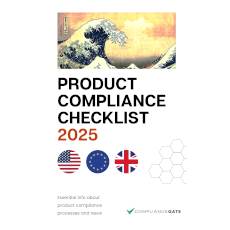
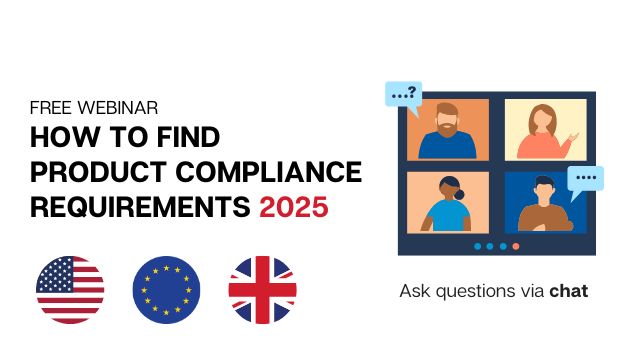
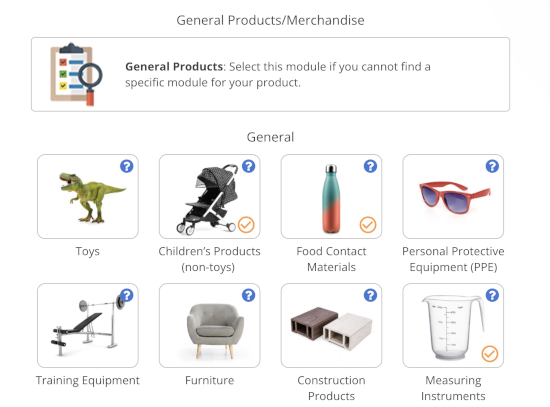

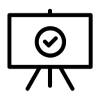
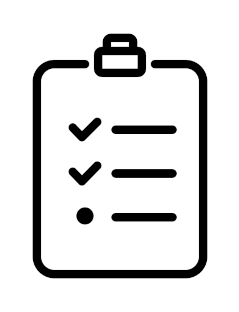



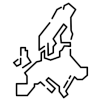



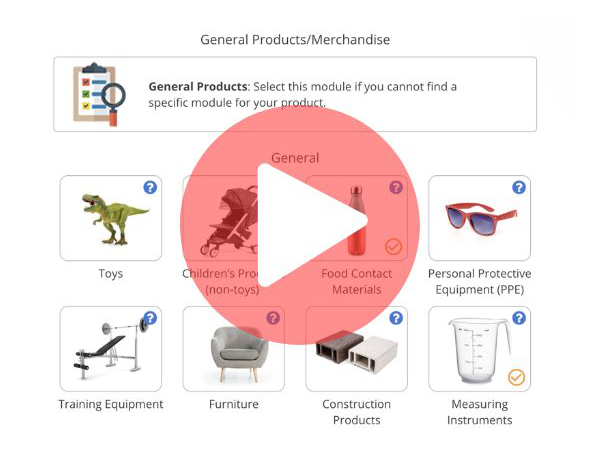
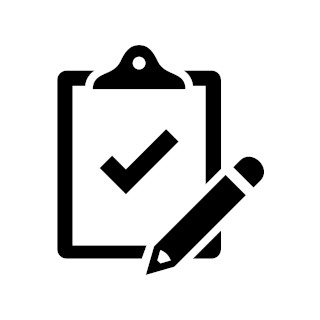 Create compliance checklists for your product (US, EU & UK)
Create compliance checklists for your product (US, EU & UK) 20+ product certificate templates
20+ product certificate templates Create label files
Create label files Book product testing
Book product testing
Great post!
Please, can you elaborate European General Product Safety requirements for cookware?
They just published these harmonised standards for example -> EN 12983-1:2023 and EN 12983-2:2023
Hi Inma,
We do not publish standards here. You must buy the standards directly from the vendors.